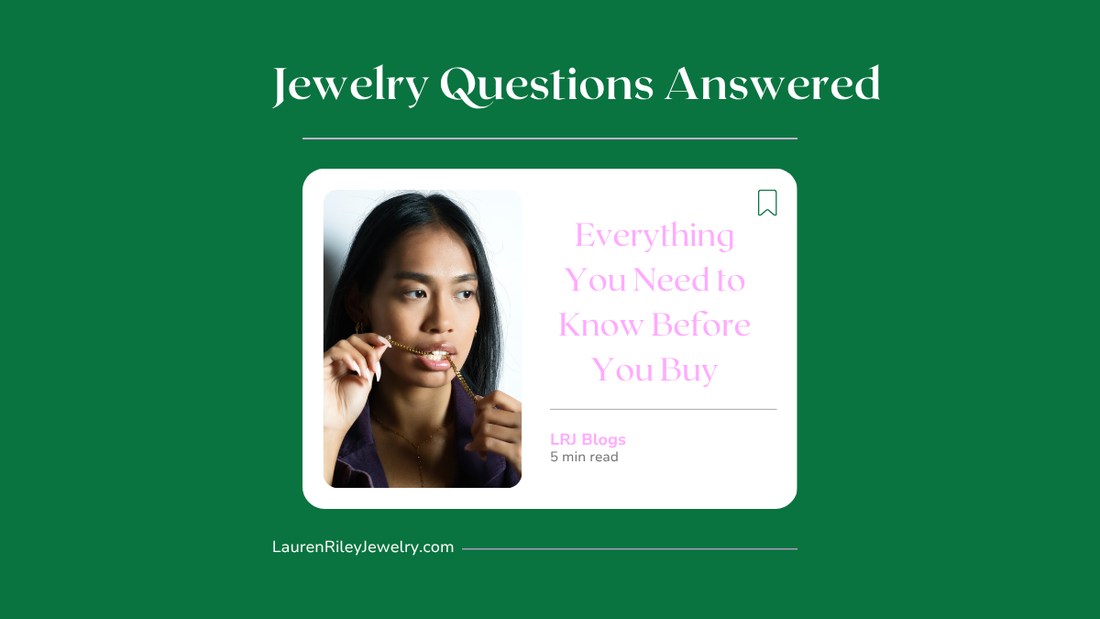
Jewelry Questions Answered: Everything You Need to Know Before You Buy
Share
Navigating the world of jewelry can feel overwhelming, especially with all the terms, materials, and care instructions floating around. Whether you're shopping for a daily-wear gold necklace, curious about PVD jewelry, or have sensitive skin, this guide answers the most common questions people are searching for online. Let's break it down with simple, clear answers.
💛 What is gold PVD, and how does it compare to other gold types?
Gold PVD (Physical Vapor Deposition) is a modern technique where a thin layer of 18k gold is bonded to a base metal using a vacuum process. This results in a tarnish-resistant, durable finish that lasts longer than traditional gold plating. It offers the luxurious appearance of solid gold at a more affordable price.
👉🏼 Read our full comparison: Gold PVD vs. Regular Gold
💧 Is gold PVD waterproof and suitable for daily wear?
Yes! Gold PVD jewelry is highly water-resistant, making it an excellent choice for daily wear. It's ideal for people who want long-lasting shine without high-maintenance care. You can wear it to the gym, during errands, or while running through life, without worrying about quick tarnishing.
👉🏼 Check out our guide: Jewelry You Can Wear to the Gym
🌿 What does hypoallergenic mean in jewelry?
Hypoallergenic jewelry is made to reduce the risk of skin irritation or allergic reactions, especially for people with metal sensitivities. It typically avoids using nickel, which is the main culprit for most allergic reactions. Instead, materials like surgical stainless steel, titanium, and 14k or 18k gold are often used.
👉🏼 Explore more: Hypoallergenic Jewelry - Style Without the Irritation
🔍 How can I tell if my jewelry is hypoallergenic?
Check for labels like "nickel-free" or "hypoallergenic." Quality jewelry brands will clearly state if their products are suitable for sensitive skin. You can also look for pieces made from stainless steel, titanium, or real gold, as these are usually safe for most skin types.
👉🏼 Read: Why Customers Are Obsessed with Lauren Riley Jewelry
🧼 How should I clean my jewelry?
Use mild soap, warm water, and a soft toothbrush to gently clean most jewelry. For delicate pieces or those with gemstones, avoid harsh chemicals or scrubbing. Always dry thoroughly with a soft cloth and store in a dry, safe place.
👉🏼 Step-by-step: How to Clean Gold PVD Jewelry Without Damaging It
👉🏼 Also see: How to Clean Gold Plated Jewelry (Without Rubbing the Shine Off)
🚿 Can I wear my jewelry in the shower or pool?
Gold PVD jewelry is water-resistant and can handle the occasional shower, but it's always best to remove any jewelry before swimming in chlorinated pools or using harsh soaps. This helps extend the shine and life of your pieces.
👉🏼 Learn more: Jewelry You Can Wear to the Gym
🧽 How often should I have my jewelry professionally cleaned?
If you're wearing pieces regularly, it’s a good idea to have them professionally cleaned and inspected once a year. This ensures your stones are secure, clasps are intact, and your pieces stay looking their best.
🛍️ What should I ask when buying new jewelry?
Here are a few questions to ask before making a purchase:
✨ What materials are used, and are they hypoallergenic?
✨ Is it solid gold, gold-filled, gold-plated, or PVD coated?
✨ Does it come with a warranty or care guarantee?
✨ How should I store and care for this item?
These questions help ensure you're getting the best value and quality for your lifestyle and skin type.
By understanding the basics of gold types, hypoallergenic materials, and jewelry care, you're empowered to shop smarter and wear your pieces with confidence.
Want more tips? Explore our blog for in-depth guides, jewelry styling ideas, and expert care advice.






